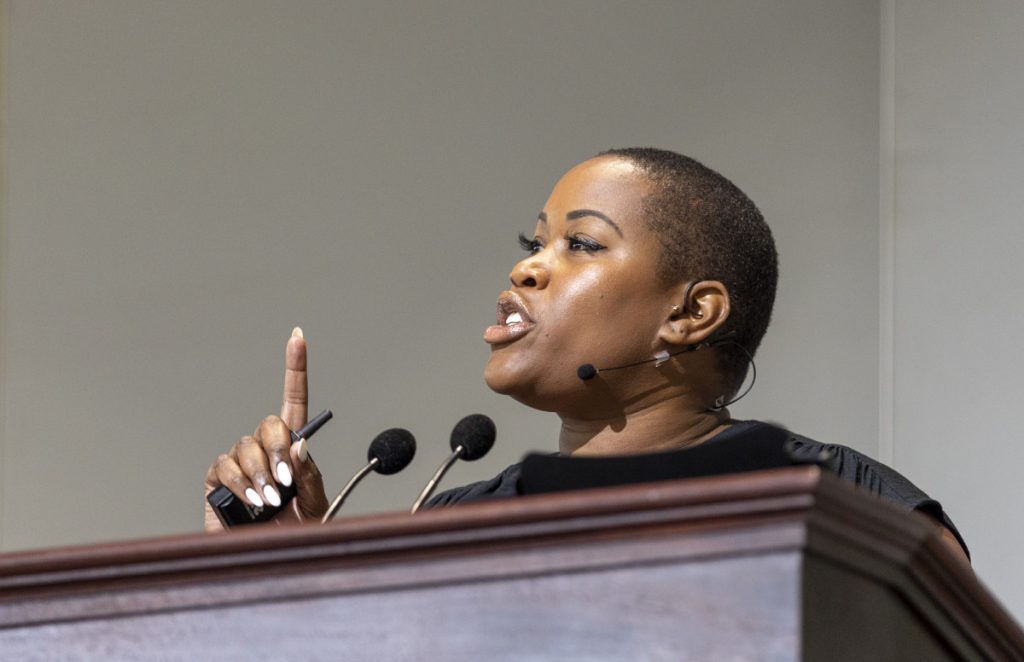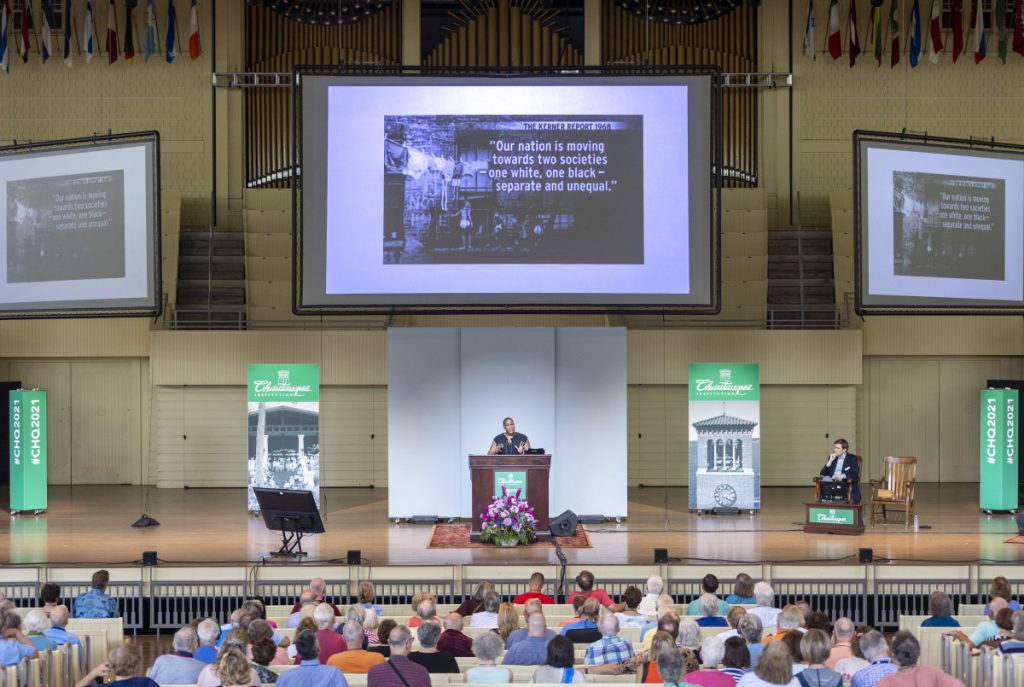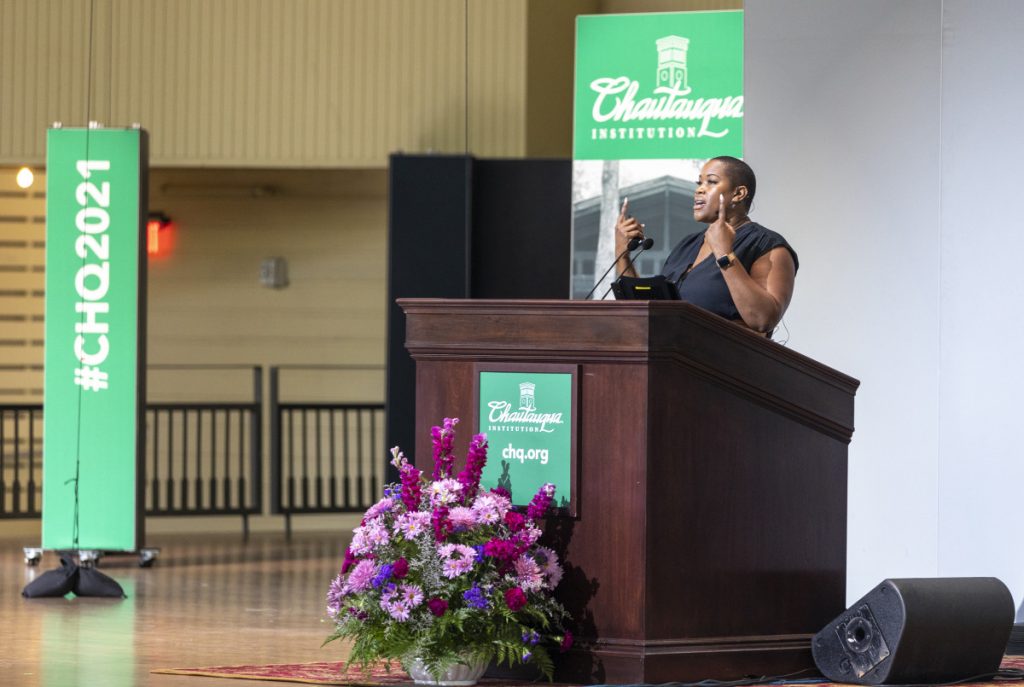NICK DANLAG – STAFF WRITER

When Meredith D. Clark was growing up, she wondered why newspaper photos of Black people always looked off.
“I could never quite figure out why the newspaper couldn’t print more flattering photos of people who looked like me,” Clark said. “But then I began to work in the field.”
She later learned that it was because the industry used “Shirley Cards,” photos of white women that are routinely referenced to calibrate light, shadows and skin tones.
“Which means if you are darker, even if you are more pale, the camera doesn’t quite see you as you are seen. It doesn’t quite pick up on the intricacies of your appearance. Similarly, news media is calibrated this way,” said Clark, who previously was an assistant professor in media studies at the University of Virginia and was recently named associate professor at Northeastern University’s College of Art, Media and Design.
A recent opinion piece by Brent Staples of The New York Times, titled “How The White Press Wrote Off Black America,” delves into how newsrooms have historically had primarily white, well-off reporters who targeted white, wealthy audiences. This lack of diversity caused wide gaps in coverage, such as a correction that ran on the front page of Clark’s own hometown newspaper when she had recently graduated college.
It read: “It has come to the editor’s attention that the Herald-Leader neglected to cover the civil rights movement. We regret the omission.”
“It was in this moment that I began to understand exactly why our preacher called the Herald-Leader the ‘Herald Misleader,’ and why my parents refused to subscribe,” Clark said.
She said journalism schools, which were also founded by white, land-owning men, always teach the importance of objectivity.
“How objective could it be, leaving out entire swaths of the American populace?” Clark said.
And she said this wasn’t just a journalism problem: Everyone has a role to play.
As well as being a professor, Clark is the author of DRAG THEM: A Brief Etymology of Cancel Culture. At 10:30 a.m. on Tuesday, July 13 in the Amphitheater as part of the Chautauqua Lecture Series, Clark explored the importance of reparative journalism, the role that Black women play in the movement, and ways society can move forward. The lecture, titled “The Time is Now,” was the second presentation of Week Three’s theme of “Trust, Society and Democracy.”
Visionary, not reactionary, and grounded in the history of the ignored

Clark said she was radicalized on Jan. 6, 2021, when she saw the U.S. Capitol riots on TV.
“Jan. 6, for an American, was one of the most difficult days of my life,” Clark said, “because it was the day that I learned that the principles that I had been taught my entire life could be for sale — that they were available for purchase to the highest bidder.”
And the highest bidder wasn’t the president or the rioters, Clark said. It was the news media.
“The news media … is subject to a cycle of 24 hours a day, seven days a week, making sure that there is something on the television, on our screens, in our newspapers that will keep us angry, afraid and on edge,” Clark said. “It took a while to recover from this hurt.”
What is needed and has been needed for a long time, she said, is reparative journalism: reporting that not only acknowledges the mistakes of the past, but actively repairs the gaps in coverage and treatment of underrepresented communities. She identified six key traits that journalism needs to strive for: It needs to be visionary, not reactionary; grounded in the history of the ignored; critically intentional, and comprehensive. It needs to find alternative funding and, what she said is usually the most controversial point, redistribute power.
In terms of the first two, Clark said journalists need to approach stories from a bottom-up mindset, interviewing those most affected first. She said that, currently, the trend in news media is to interview people in charge, and then slowly, if at all, move down the ladder of power.
“How do you begin to see the world differently when you look from underneath?” Clark said.
Journalism also needs to move away from reacting and waiting for events to happen, Clark said, and move toward actively seeking stories.
“We know that there is plenty of uncovered news and information that the world needs to know,” Clark said. “That’s why we celebrate unknown stories and unknown histories when they come to light.”
Though there has been more of a push in recent years for more diverse newsrooms, people in power have known about this problem for decades. In 1967, President Lyndon B. Johnson ordered a review of the dividing society in America. This report, called the Kerner Commission, found that “Our Nation is moving toward two separate societies, one white and one Black, separate and unequal.”
Clark said that the report also put much of the blame on the growing divide on the news media, not because it was sensationalizing or fear-mongering, but because “the news media simply did not have the depth of understanding that it needed to communicate to different sectors of society, what it was like to live outside of privilege.”
Critically intentional and alternative funding

Black women, Clark said, are at the center of the push toward reparative news and being critically intentional in order to better represent every part of society.
She defined many key features of Black feminism. Black feminists have historically been a part of an oppressed group, from journalism schools not admitting Black women until the 1950s to Black women, currently, having a disproportional amount of college loan debt.
“They were subjected to the same sort of oppression that white women experienced with the added layer of racism. … Black women experience disparities in terms of health care, maternal mortality, and even their opportunity to move in the ways that this country says we can be effective in terms of social mobility,” Clark said.
Another key point is that Black women are a diverse group with different beliefs, class, education and age.
“I mentioned this to help us remember that when we see people from different backgrounds, who are held up as an exemplar of what the Black community is or does or what the LGBTQ community is or does, we have to remember that we are talking about a range of experiences — with some commonality,” Clark said.
Black feminists throughout history have found alternative ways of making progress, such as organizing child care during the civil rights movement so that people could attend protests and, now, utilizing hashtags on social media to spread information.
And Clark said the journalism industry, like Black feminists, needs to find alternative ways to progress, especially when it comes to funding. With print advertising decreasing, local journalism shrinking and large corporations taking over small newspapers, she said, this is a large issue the industry is trying to address, and that she did not have the answer.
Comprehensive work and redistributing power
In 2019, the Associated Press changed their stylebook to say that journalists could write that things were racist — something that was actively discouraged previously. It was a good first step toward reparative journalism, but more should be done, Clark said.
“It’s not enough to simply repair the surface issues. We must look beyond, into the wounds that have been leveraged against our respective communities and find what needs to be addressed,” Clark said.
As well as being comprehensive, Clark said reparative journalism requires a redistribution of power, not through violence, or even through one side losing, but simply by thinking about who is put at the center of stories.
Clark said this is part of the hard work ahead, for journalists, executives, economists and readers.
“Reparative journalism, like the struggles for freedom, for justice, for equality, is the work of generations,” Clark said. “It begins with us today. It continues long after we are gone, and I invite you to join us into this great work.”
As part of the Q-and-A session, Matt Ewalt, vice president and Emily and Richard Smucker Chair for Education, asked Clark to discuss the role of transparency in reparative journalism.
In a study Clark conducted in 2018, she talked to people in communities who didn’t pay attention to the news media.
“They said one of the reasons that they didn’t was because it was so artificial, that there was no transparency about how stories came to be,” Clark said.
She said readers want to know how the article was created, and for the writer to acknowledge their own biases.
Ewalt then asked what the ideal structure for journalism could be.
Clark said that the perfect structure isn’t known yet. She said that the industry, as it currently exists, supports many jobs and families — so upending it isn’t realistic.
“We cannot wait for one system to become obsolete in order to take up this challenge. Some of that work has to begin where we are right now, and so there are pushes that are happening from inside the house that help with that regard,” Clark said. “I will never say that I see a singular model or a singular form for reparative journalism.”




